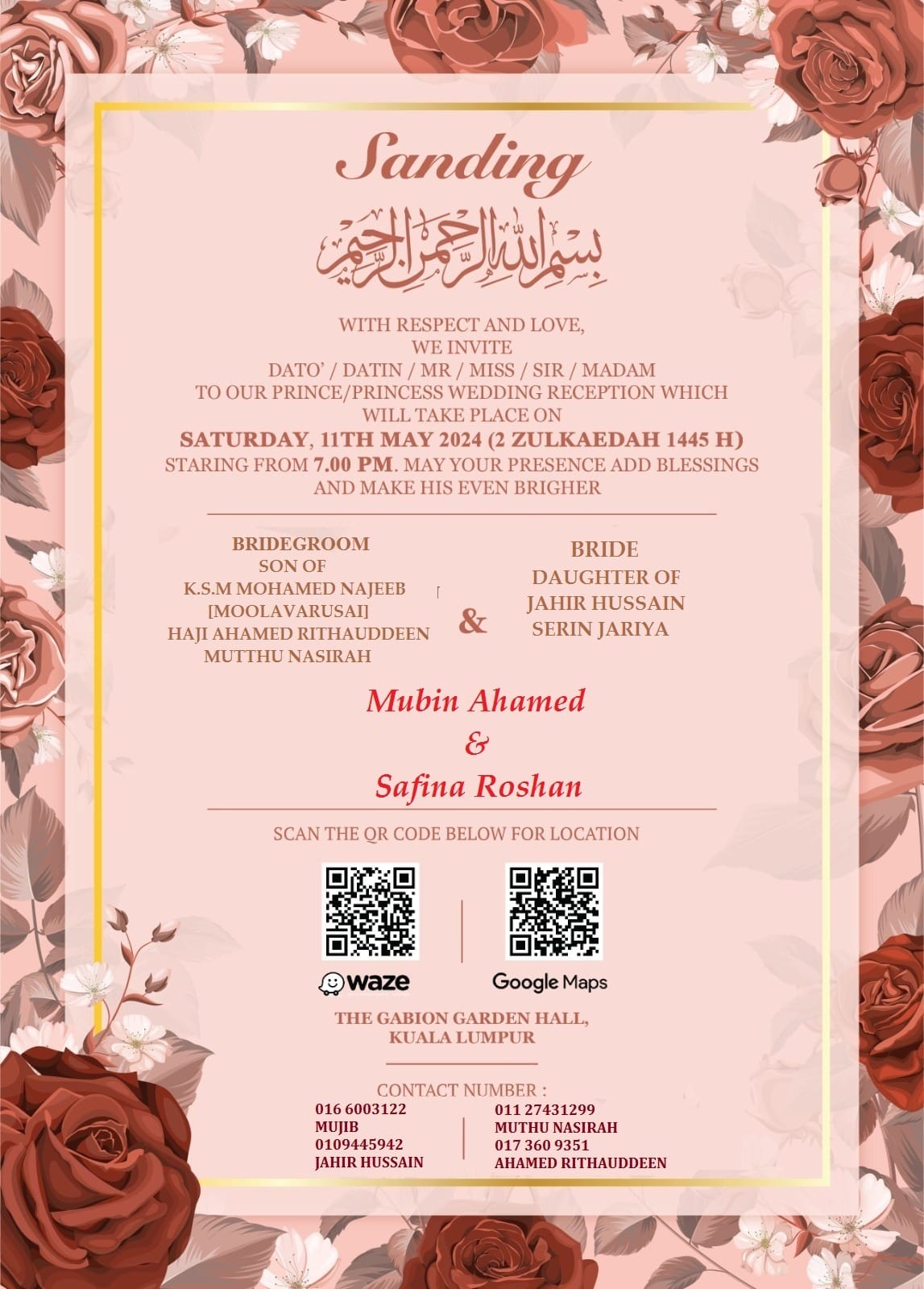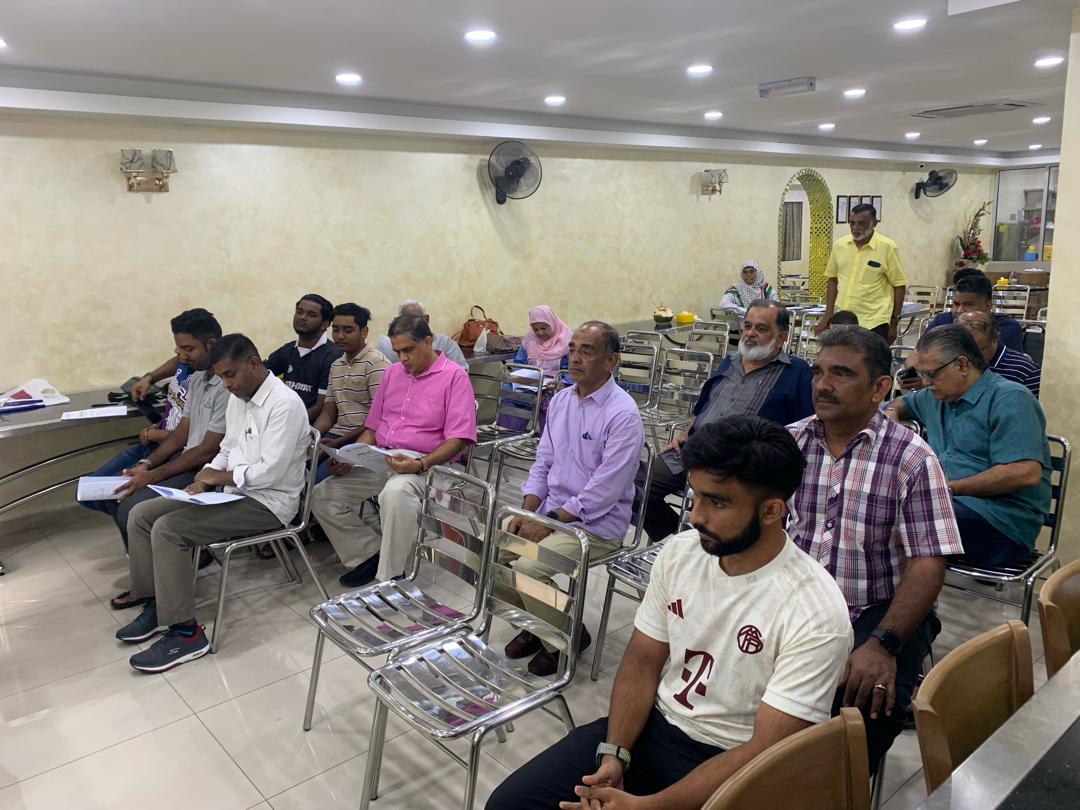Punishment for Apostasy & Adultery
- WEDDINGS & EVENTS
- Punishment for Apostasy & Adultery
Punishment for Apostasy & Adultery
Response to Syed Akbar Ali’s article ‘Tariq Ramadhan At The RSOG’ at
http://syedsoutsidethebox.blogspot.com/2012/07/tariq-ramadhan-at-rsog.html
Professor Tariq Ramadan could be intelligent as per your perception; but it does not mean his views must be correct. An intelligent person’s views need not always be right, as Al-Quran itself illustrates. Iblis was very intelligent – so intelligent that he even argued with his Creator. His argument was that he, being created from fire, was superior to Man, who is created out of mud – a worthless substance. This is told in Al-Quran. (Iblis, being so very intelligent was even the teacher of malaikats, is another matter not found in Al-Quran; but is narrated inhadis, which of course would not be accepted by the anti-hadith group. So, for argument, I will stick to Al-Quran.) Iblis’s unbridled intelligence led him to kufur; and brought the Wrath & Curse of Allah SWT. This is just to illustrate that not all that is uttered by intelligent persons can be right. It is, as I see it, the same with the views of Tariq Ramadan. He can be a well-known public figure in the West; but, certainly not in the East.
He might have delivered lectures in Western platforms, to the cheer & applause of the Western audience. It is not at all surprising. Salman Rushdie & Taslima Nasreen were also most welcomed in Western countries; and praised & honoured! Would that make them acceptable to Islamic scholars? No! They may be clever & intelligent, as Iblis was, but, in view of Islam they are most cursed by Allah SWT – as Iblis was cursed.
Tariq Ramadan could have been applauded in Western countries because, it is what the Westerners want – to demerit Islam to the maximum. Why not he present his views of ‘norejam for adultery; no death for apostates’ in Darul Uloom, Deoband; or Darul Uloom Lucknow; or, any other Islamic institutions elsewhere in India or Pakistan? His views would have been battered & bashed by the evidences produced by the scholars there!
There are many matters for which Al-Quran does not give outright solutions. The solutions, or the explanations are left to the task of Prophet Muhammad SAW. “We have not revealed to you the Book, [O Muhammad], except for you to make clear to them that wherein they have differed and as guidance and mercy for a people who believe.” [16:64] (the word ‘lithubayyina’ in this verse means ‘explain’)
There are many obligations in Islam, the manner of practice of which is not mentioned in Al-Quran. For example, regarding prayers, though the number of times and the times of prayer in a day are mentioned in Al-Quran, the number of rakaats of each prayers; and the way to perform the prayer – number of times of sujud & ruku’ is not mentioned in Al-Quran. Then, how does one perform his prayer?
Al-Quran instructs every affordable Muslims to pay zakat. Does Al-Quran say how much to pay? No! Then, how much is one going to pay? Is it enough for a very rich man to pay just a couple of hundred Ringgit; or, dollars; or, Rupees; or, Yen? Or, just 1 or 10 Ringgit? Will that be logical & acceptable? No! So, how are we to know how much to pay? I am sure Syed Akbar Ali is in a position whereby he should pay zakat. So, how much does he pay? Or, is he paying as he likes?
Al-Quran instructs every Muslim who can afford it, to perform Haj at least once in his lifetime. Is there anything mentioned in Al-Quran as to how to perform the Haj pilgrimage? What are the rites that must be fulfilled ? is there any account of these things in Al-Quran? No! Then, to which source do we turn to, to know these things? Presuming Syed Akbar Ali and Tariq Ramdan have performed their haj pilgrimage, how did they perform their Haj rituals? To which source did they refer to? Al-Quran alone? I have asked these questions to all those anti-hadith people, with whom I have had discussions. None could answer! Because, no one can ever answer these.
Al-Quran says: “(It is) a Book We have revealed to you abounding in good that they may ponder over its verses, and that those endowed with understanding may be mindful.” (38:29)
Al-Quran instructs Muslims to ‘ponder over its verses’. ‘Pondering’ leads to great thoughts & explanations. (I quote only a few verses as examples to save time & space.)
Each & every word of Al-Quran has got explicit & implicit meaning. It is the ‘pondering’ of the verses of Al-Quran that had created so many scientists, astronomers, mathematicians, physicians, etc. among Muslims in the Golden Era of Islam, when the rest of the whole world (including the West) was in ‘darkness’ (darkness in knowledge).
1. A verse in surah Yaasin, which we Muslims always read:
“Verily! We have put on their necks iron collars reaching to chins, so that their heads are forced up.” (36:8)
What do the ‘iron collars reaching to chins’ mean? Is there any explanation in the Quran? We don’t see people with iron collars around their necks?
2. “And We have put a barrier before them, and a barrier behind them, and We have covered them up, so that they cannot see.” (36:9)
Who are ‘them’? What is the ‘barrier before them’; and what is the ‘barrier behind them’? And what is that which has ‘covered them up’? I don’t see any barrier in front of or behind anyone! I don’t see any veil covering them, such that they cannot see! So, what does this whole verse mean? Don’t we require a detailed explanation from some other source?
3. A verse from surah Ad-duha 93:7
“Did He not find you wandering about and give you guidance?”
Where & why was he wandering? (Presuming ‘he’ refers to Prophet Muhammad (SAW)
4. A verse from surah Ibrahim (14:24-25)
“Have you not considered how Allah presents an example, [making] a good word like a good tree, whose root is firmly fixed and its branches [high] in the heavens? Giving its fruit at all times, by the Leave of its Lord and Allah sets forth parables for mankind in order that they may remember.”
What is that ‘good word’? What is that tree which has its branches reaching to the heavens? (As far I know, the branches of any tree, anywhere in the world are only up to a maximum of about 200 feet!) What is that tree which yields fruits throughout all seasons?
5. A verse from surah An-Nur:
“Allah is the light of the heavens and the earth; a likeness of His light is as a niche in which is a lamp, the lamp is in a glass, (and) the glass is as it were a brightly shining star, lit from a blessed olive-tree, neither eastern nor western, the oil whereof almost gives light though fire touch it not– light upon light– Allah guides to His light whom He pleases, and Allah sets forth parables for men, and Allah is Cognizant of all things.”
What is the blessed olive tree which is neither eastern nor western? What is the lamp in a glass? How can the glass be lit from a blessed olive-tree? Many such questions can be asked from this one single verse, for which only explanations
from other sources can give an answer. (24:35)
Allah SWT, in various places in Al-Quran, Swears upon many things. For example:
- “I swear by this city.” (90:1) (To which city is He referring to? Needs explanation; doesn’t it?)
- “I swear by the Day of Resurrection.” (75:1)
- “I swear by the self-accusing soul.” (75:2)
And, He swears by so many other things: (79:1-5) (92:1-3) (95:1-3), etc.
Man, naturally a weakling, who is sometimes bound to say things that are untrue, has got to swear on something holy – God; or His revelation – to prove that he is telling the truth. Why should Allah SWT – the Creator of everything in ‘aalam’; the Sustainer of everything; the Most Just; the Truth and nothing but the Truth, “……..His Word is the truth…….” (6:73), Swear to prove His point? And, why does He mention these various objects & phenomena as objects for swearing? Is this not most perplexing to the inquisitive mind which ‘ponders’ (as instructed by Allah SWT in 38:29.
Is anything mentioned about these in Al-Quran? No! He leaves it to His prophet to explain – “Lithubayyina”.
I think these examples suffice to prove that explanations from other sources (hadis & tafsir) are definitely needed to understand Al-Quran. (Here, I would like to caution: if anyone who rejects hadis & tafsir, try to answer my question by starting to explain, that very moment they are deemed to agree that their view so far against hadis & tafsir had been totally wrong; and that hadis & tafsir IS NECESSARY to explain & understand Al-Quran.)
I am sure Syed Akbar Ali, and people like him would have been to schools & colleges. In the schools & colleges, textbooks would have been given for each subject. Why are then, the teachers & lecturers there? According to people like Syed Akbar Ali, the textbooks should have been enough. No need for teachers or lecturers to explain the textbook. What would have been the outcome, if there had been no lecturer or teacher to explain the matter in the textbook? I underwent that tragic experience. I was then known among my colleagues in my school as ‘maths genius’. When I went to second year of HSC (presently STPM), the maths teacher (a very dedicated, wonderful Indian lady) was transferred to Penang TTC; and, there was no replacement at all. We had to depend only on our textbooks! Some of my colleagues left, to go to other schools. I remained; but, do you the outcome? This ‘maths genius’ FAILED! Why? No teacher to explain & guide me, though I had all the textbooks. Man-written books need people to explain them. Would it not then be necessary for Revelations from Allah SWT, to be explained? Anyone who tries to study Al-Quran & Islam without teachers (prophets) and explanations (hadis & tafsir) would certainly FAIL miserably, in attaining their goal – ‘Redha Allah’ and Paradise.
Regarding the punishment for apostates, one of your readers has very aptly quoted the episode of the first Khalifah, Saidina Abu Bakar’s waging war against the apostates, to prove that punishment.
To prove the punishment of rejam for adultery, I would like to quote an episode that happened during the reign of the second Khalifah, Saidina Umar ibnu al-Khattab. A married woman was brought to his court with the charge that ‘she had given birth to a child, just 6 months after marriage; and so, she must have committed adultery. She must be punished.’ Hearing this, the Khalifah was about to give his verdict of rejam, when Saidina Ali ibn Abu Talib intervened and said: “It is possible for a woman to deliver a live baby after 6 months of pregnancy.” Hearing this, the Khalifah exclaimed: “Astaghfirullah! (May Allah forgive me). If you had not told this, I would have committed a grave error by passing a sentence of rejamon this woman.”
This event shows that Khalifah Saidina Umar ibnu al-Khattab would have passed the sentence of rejam to that lady, thinking that she had committed adultery. This means, the sentence for adultery is rejam. And, Saidina Umar ibnu al-Khattab is well-known for his justice based on Al-Quran & sunnah.
Is Syed Akbar Ali greater, or more knowledgeable than Saidina Umar ibnu al-Khattab? It is for the readers to decide.
I am responding to Syed Akbar Ali’s article on punishment for apostasy & adultery, NOT as a debate. I know very well that any amount of logical reasoning with proofs from any source, would have no effect at all for people like him. They will always be very firm in their conviction because Allah Himself has said of such people: “What, do they not ponder the Quran? Or is it that there are locks upon their hearts?” (47:24)
And, they are “Deaf, dumb and blind – so they will not return [to the right path].” (2:18)
I am presenting my argument for the readers of Syed Akbar Ali’s blog to judge for themselves. Hope this would be posted without prejudice in his blog.
Categories
Events
Blog Archieve
- [+] 2024 (2)
- [+] 2023 (2)
- [+] 2021 (2)
- [+] 2020 (8)
- [+] 2019 (5)
- [+] 2018 (5)
- [+] 2017 (4)
- [+] 2016 (16)
- [+] 2015 (42)
- [+] 2014 (36)
- [+] 2013 (15)
- [+] 2012 (19)
-
[+]
2011 (61)
- [+] January (7)
- [+] February (7)
- [+] March (4)
- [+] April (1)
- [+] May (5)
- [+] June (1)
- [+]
July
(8)
- Kem Ibadah Wanita Pra-Ramadhan
- Invitation to Majlis Berbuka Puasa MAMJ
- Majlis Berbuka Puasa MAMJ 2011
- Ramadhan 2011 Fund
- Another Achievement by Our Past President Haji Mohamed Ismail Sharif – He is Among the Top 50 Islamic Finance Lawyers Globally. Alhamdulillah
- பட்டமளிப்பு விழா
- Majlis Buka Puasa Amal 2011 – Anjuran Indiamuslim.org (IM.ORG) Dengan Usahasama Muslim Manaver Sanggam (MMS)
- Chess tournament
- [+]
August
(9)
- ALL RELIGIONS SAY ‘ONE’ – Part 2 (In Hinduism, Sikhism, Christianity, Judaism, Confucianism & Buddhism)
- ALL RELIGIONS SAY ‘ONE’ – Introduction
- PENYERTAAN PAS DALAM PERARAKAN BERSIH 2.0
- BAN ON RECITAL OF THE QURAN OVER LOUDSPEAKERS IN PENANG
- MY VIEW ON MARISA DEMORI’S LETTER IN NEW STRAITS TIMES
- THE ISSUE OF MURTAD (APOSTASY)
- ALAGAI PATTAMALIPPU VIZHA
- THANK YOU MAMJ MEMBERS
- RAMADHAN MUBARAKH!!!!!
- [+] September (5)
- [+] Octobar (4)
- [+] November (3)
- [+] December (7)
-
[+]
2010 (160)
- [+] January (8)
- [+] February (3)
- [+] March (1)
- [+] April (3)
- [+] June (1)
- [+]
July
(15)
- ஜோதிடம் , சகுனம் பார்த்தல் : இஸ்லாமியக் கண்ணோட்டம்
- OUR PRESIDENT AND DATIN VISIT DR.APJ ABDUL KALAM
- உம்மத்தின் வழிமுறை
- IBUBAPA
- The Key to Raising Righteous and Successful Children
- ங்கள், செலவழிக்கும் முன் சம்பாதியுங்கள்
- A New Domain Extension “.CO” Launched
- தாம்பத்திய உறவு
- கமலாதாஸ் – ஸுரையா :
- உறவுக்கு அப்பால் தாய் தந்தை
- PERIYAR DASAN’S SPEECH AT JEDDAH:PHOTOS
- பெண்ணுரிமையும்! இன்றைய பெண்களும்!!
- FAMILY VALUES : THE MOTHER
- Invitation to Program Rapat 1Malaysia
- Just See What British Thought of India and How They Managed to Rule Us
- [+]
August
(19)
- ALLAH THE GREATEST
- RAMADHAN : MONTH OF PATIENCE
- My Mother, My Best Friend
- RAMADHAN : MONTH OF PATIENCE
- Enriching the Community
- ZAKAT DISTRIBUTION
- 6-Story Jesus Statue Struck By Lightning!!!
- இல்லறமே நல்லறம்!!!
- வரதட்சணை : பூனைக்கு மணி கட்டுவது யார்?
- Dato’ Haji Thasleem and Datin Dr.Yazmeen with Dr. APJ Abdul Kalam
- அமைதியை இழந்து தவிக்கும் அமெரிக்க வீரர்கள்!
- WE ARE THE HONORABLE WOMEN OF ISLAM!
- Recent Archaeological find by Aramco During Gas Exploration in Saudi Arabia- Subhanallah
- ஒரு சகோதரியின் உலக சாதனை !
- BELOVED AMMA & ATTHA
- எதை கொடுப்பது ? எதை எடுப்பது?
- திருமணம் என்பது ஒவ்வொரு மனிதனில் வாழ்விலும் ஒரு முக்கியமான அம்சம்.
- முஸ்லிம்களுக்கு ஏன் இவ்வளவு பெருமை என்று வியந்தேன்…
- ஏன் இஸ்லாம் — ஆமினா அசில்மி
- [+]
September
(21)
- A Police Officer Wrote This! Please Read coz may Save your Life!
- Al-Quran
- APPEAL FOR LAND BY MAMJ
- History Mystery – Interesting and Incredible
- Makkah (SubahanAllah) -Current Development
- Prophet Muhammad SAW Praised by Non-Muslim Leaders and Philosophers
- Interactive Sites on Medical Information
- Indraiya Poluthu Iniya Poluthaaga Amaiyattum
- BABRI MASJID CASE -JUDGEMENT ON 24TH.SEPTEMBER 2010
- நபி மொழிகள் !!!
- The Minor Signs of the Last Day
- அல்லாஹ்விடம் உதவி தேடுங்கள்!
- Walking Helps Keep Body and Brain Young
- NY imam says mosque fight worth the controversy
- BELOVED ATTHA : YOU ARE THE BEST
- ஒரு குத்துச்சண்டை வீரரின் அழுகை!
- Ahmedabad’s Bus System a Hit with Several Countries
- Breaking News-RAMADHAN FUND 1431H
- All for a Palm Tree in Jannah
- MAMJ President at The Orphanage in Kg.Manjoi Ipoh
- MAMJ President at Buka Puasa Organised by Tanjung Muslim Association Penang in Association with Penang Hindu Sangam and Klinik Derma Sivasanta
- [+]
Octobar
(34)
- The Human Camera
- Outstanding Animations
- Best Signpost in India
- காய்கறிகள் பழங்கள் மூலமாக இருதய அடைப்பை நீக்க முடியுமா ?
- Better to be Lion Hearted!
- Peace of Mind Tips and Advice
- சில பொன்மொழிகள்..
- India’s Rare Pictures
- Home of a Mexican Drug Lord being raided!
- What is I C E ?
- Life iN the Year 3000
- GEMS OF WISDOM
- Regular Health Mistakes
- மகிழ்ச்சியாக இருப்பதற்குக் காரணங்கள் தேவை இல்லை
- Existence of Allah
- TO ALL AMMA’S : IMPORTANCE OF BREASTFEEDING
- ஆரோக்கியமாக வாழ ..
- Brain Damaging Food and Habits
- The status of the family in Islam
- Allah looks to your Heart & Deeds
- Shine a Light and enjoy your Coffee
- Be Very Careful of Rat Urine/Droppings
- THE PAST IS GONE FOREVER!!!!
- Taxi in Dubai
- Coincidental! – Good for Your Health
- ALLAHU AKHBAR!!
- The First Medical Council in The World
- Inside Ka’bah & Airmata Rasulullah SAW
- A Muslim Student in India Fights for Her Right to Dress in Islamic Way
- The Best Person in The History of Mankind
- FABULOUS COMPILATION
- ETIQUETTE OF NAMING CHILDREN
- Islam Again in Ayodya
- Interview with British Journalist Yvonne Ridley
- [+]
November
(38)
- Suhas Gopinath from Bangaluru,WORLD’S YOUNGEST CEO
- IF YOU HAVE A WILL, YOU WILL!!!!
- DISIPLIN ANAK-ANAK!!
- BE READY!!!!!!!!!!!!!
- REMEMBER! REMEMBER! REMEMBER!
- 360 DEGREE PICTURE – THE COCKPIT OF THE AIRBUS A380
- Allah takes Your Soul When You sleep
- 16 Amazing Photos that captured the world
- Be Amazed By The Beauty Of Nature
- MAMJ Presidents Speech at Masjid Muslim India Ipoh
- A Story of Appreciation
- Mirror or 2-Way Glass? BE CAREFUL
- God’s Work
- English is a Funny Language
- Hari Raya Aidiladha Wishes
- Superb Sentences By Famous People
- Dont Be Serious, Be Sincere
- Eating Fruits The Proper Way
- MUSLIM MOROCCANS LIVEHOOD
- Tony Blair’s sister-in-law Lauren Booth converts to Islam
- Success dosen’t come within a day! – MAMJ n Alagai Makkal
- பெண்
- THE SMALLEST GIRL IN THE WORLD!!!!!
- கோபம் – வேண்டவே வேண்டாம் !!!
- FED UP OF LIFE?
- SOCIAL CLASSES IN ISLAM???
- The Charles Schulz Philosophy
- ஆசைகளை சீர்படுத்துங்கள்
- ஆசைகளை முறைப்படுத்துங்கள்
- CWG 2010 Special – PHOTOGRAPHY
- Sejda Miracle
- Wedding Dates -Avoid Clash of Dates
- New Drug in Schools? Parents Please Take Note
- DEATH SENTENCE FOR A KIDNAPPER IN YEMEN
- AMAZING TRAIN ROUTES
- RICH INDIA? POOR INDIA? DO YOU BELEIVE THIS?
- One Call (ESTAWOO = Arrange yourselves) and The Impossible Happens
- To All Parents!
- [+]
December
(17)
- 14 YEARS OLD MOHAMED SUHAIL’S ACHIEVEMENTS:
- CONGRATULATIONS TO ALL MAMJ STUDENTS WHO SUCCEEDED IN PMR
- Notification of Wedding Dates
- Benefits of Drumstick leaves ( Tamil – Murungai leaves )
- Small teaser for Alagai Makkal..Enjoy!
- Niagara Falls 99 years ago. Worth Looking At
- 4 THINGS YOU PROBABLY NEVER KNEW YOUR MOBILE PHONE COULD DO
- ALAGANKULAM BIRDS SANCTUARY
- The Goodthings of HONEY
- The Ugly Briton
- The Cucumber
- Naive, Dim-wit or Extreme?
- Worth reading!
- Unconditional Love
- Muharram Message
- Muharram Greetings
- Amazing Houses Around the World – General Knowledge for Alagai Makkal
-
[+]
2009 (20)
- [+] September (2)
- [+] Octobar (3)
- [+] November (4)
- [+]
December
(11)
- Islam and Science
- Speak more in Malay -Dr. M Tells Indian Muslim
- Annual tax filing for YA 2009 – are we ready
- Divorce?! Separated!? Why?
- Wearing hijab – Compulsion, option or willingness?
- MAMJ EXCO MEET THE MEMBERS AT SUNGAI PETANI
- DINNER AND GIFT PRESENTATION TO EXCO MEMBERS 2006 – 2009
- Newspaper Clippings from India
- Eid al-Adha and Hajj 2009
- Thoughts to Share
- 2009 MAMJ Imam Al-Ghazzali Merit Awardees
- [+] 1996 (1)
- [+] 1993 (1)
- [+] 1881 (1)
-
[+]
0 (1)
Advertisement
Newsletter Sign Up
For Latest Updates




